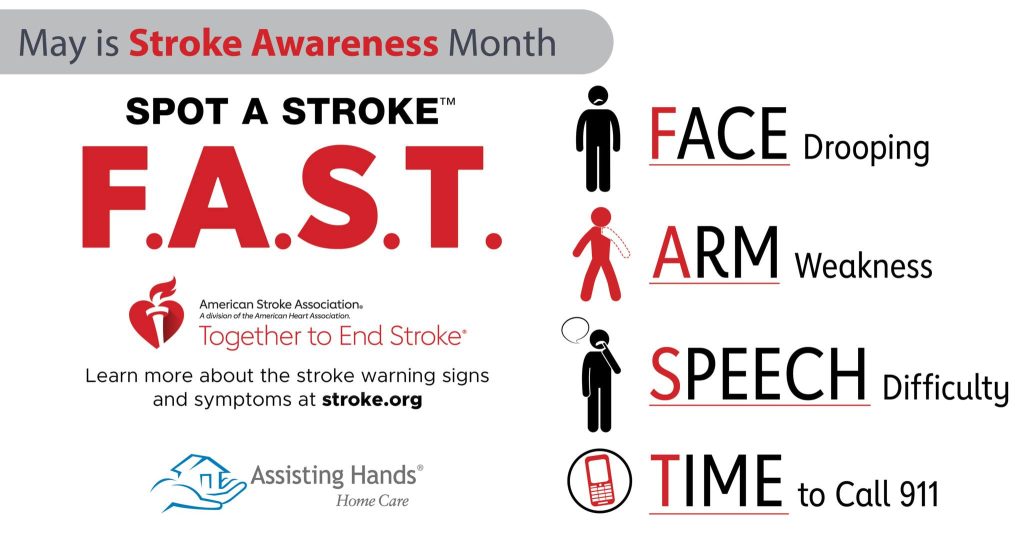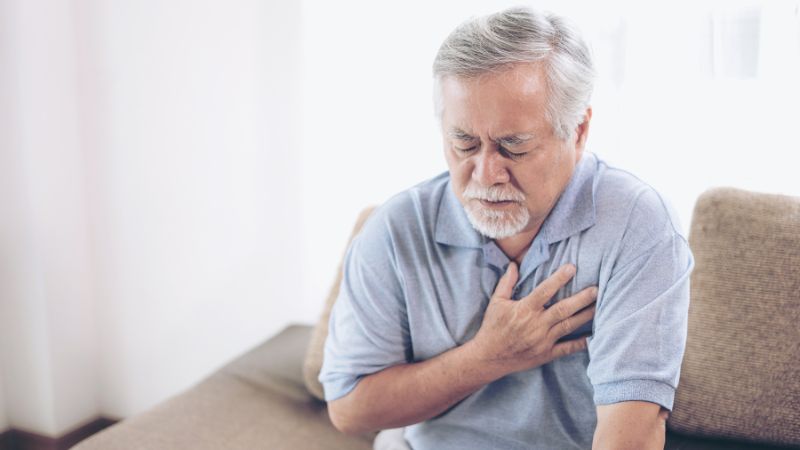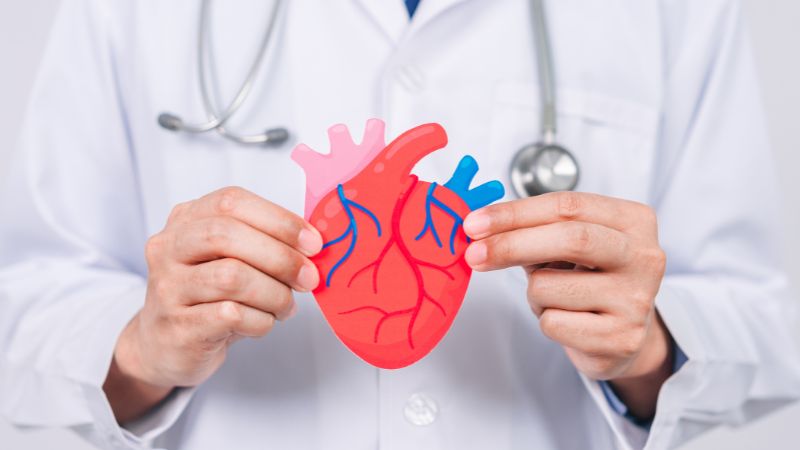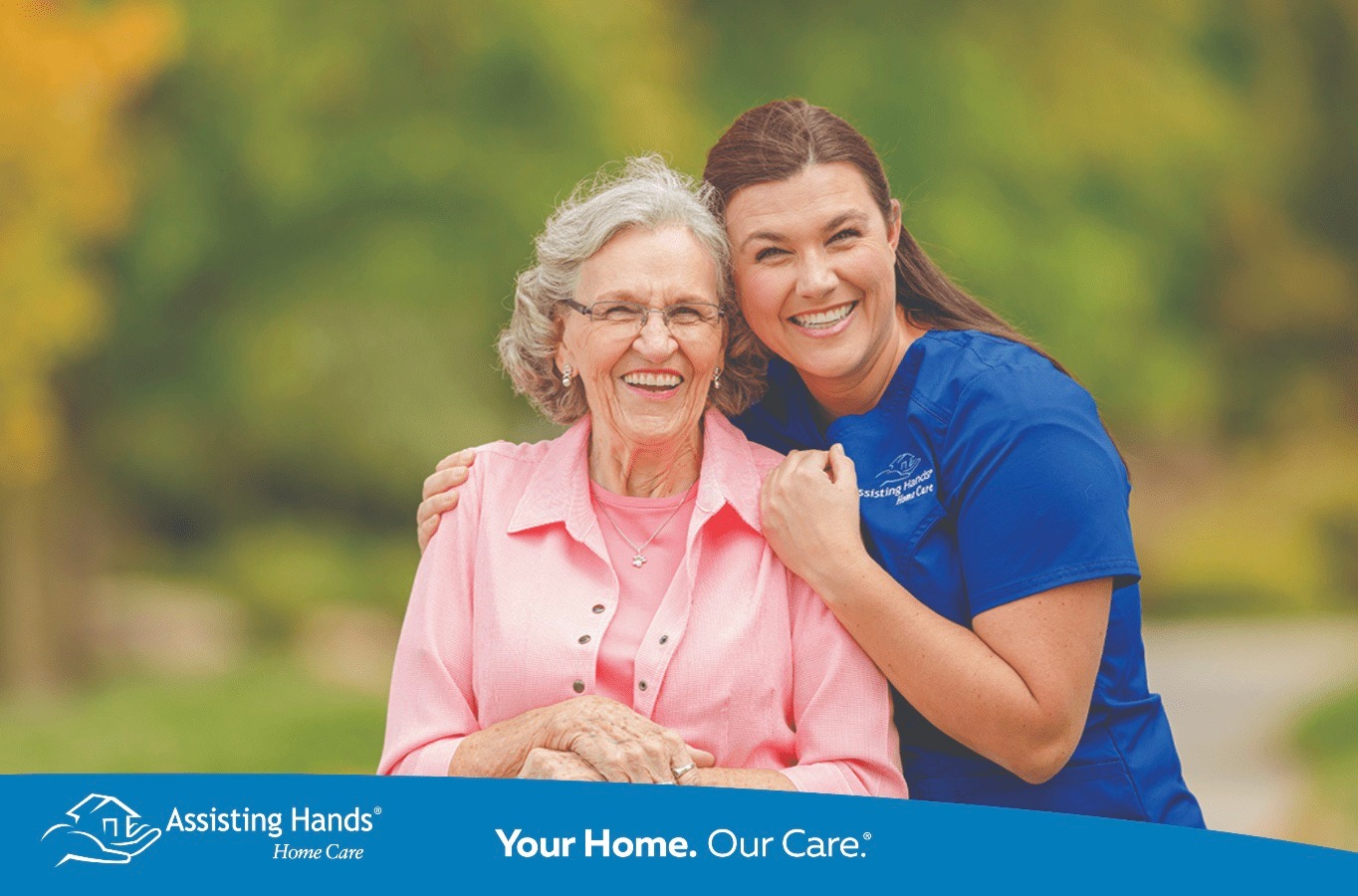As per the Centre for Disease Control and Prevention(CDC), Each year, more than 795,000 Americans suffer from a stroke, with about 610,000 of these being first-time or new occurrences. In 2021, stroke was responsible for one out of every six deaths caused by cardiovascular disease.
National Stroke Awareness Month
May is National Stroke Awareness Month, which reminds us to come together in the fight against stroke by spreading awareness of the F.A.S.T. warning signs. As we age, stroke becomes an even more urgent concern, especially for seniors who are at higher risk. It’s essential for caregivers to stay vigilant and understand the many factors that can lead to strokes in older adults. This month is all about raising awareness, preventing strokes, and acting quickly if one occurs. By learning about risk factors, recognizing warning signs, and promoting healthy habits, we can significantly reduce the likelihood of strokes happening. Together, through community efforts, educational initiatives, and increased awareness, we can make a real difference in combating strokes and improving outcomes for everyone affected.

What is a Stroke?
A blocked artery or blood clot blocks the blood supply to the brain. When this disruption occurs, it is known as a stroke. Damaged blood vessels also cause a stroke. Brain cells rely on oxygen to function and an interruption to the brain’s blood supply leads to brain cells dying.
Serious long-term health symptoms can result when brain cells become damaged due to a stroke. If the senior does not receive medical attention right away, a major stroke can even lead to death. The older adult’s chances at a good recovery increase when they receive immediate help.
Are Mini Strokes Common in the Elderly?

A mini-stroke is known as a transient ischemic attack (TIA). This occurs when the blood vessel is temporarily blocked. Once the blood supply returns, symptoms are relieved and the brain cells do not undergo permanent damage. A TIA can warn of a major stroke in the future.
Due to a TIA being a sign of an impending major stroke, caregivers must get medical help for the senior. This is the case even if the symptoms resolve on their own. Approximately 1 in 4 individuals who experience a TIA eventually suffer a stroke.
What are the Signs Before a Stroke?
Caregivers should be aware of FAST, an acronym that describes the warning signs of a stroke. It stands for face drooping, arm weakness or numbness, speech problems (such as slurring or trouble repeating words), and time to act quickly and call an ambulance.
Other signs of an impending stroke include the onset of a sudden, severe headache. The senior may experience sudden dizziness or lose their balance and have a severe fall. Vision changes to one or both eyes may occur. Feelings of confusion may arise, even about situations familiar to the senior.
Symptoms like these, as well as numbness to one side of the body, often manifest suddenly. They may even appear several days prior to a major stroke. Based on one study, 43 percent of stroke patients experienced mini-stroke symptoms up to a week before they had a major stroke.
What is the Average Life Expectancy After a Stroke?
A stroke affects a senior’s life expectancy. But stroke patients who receive medical attention within three hours after the event experience a better outcome. Some seniors who have a stroke make a full recovery and live for many years. Others endure a reduced quality of life and life expectancy.
Life expectancy varies from one stroke patient to the next. However, similarities appear. One study found a 5.5-year reduction in lifespan in seniors who experienced any type of stroke. Study participants, including those who survived 30 days after a stroke, had a survival rate of 5 years.
What Can Cause Seniors to Have a Stroke?
Here, we’ll explore several factors that can contribute to strokes in seniors, highlighting the importance of awareness and preventive measures.

Medical Conditions
Several modifiable and unmodifiable factors influence a senior’s chances of experiencing a stroke. Common health conditions that increase a person’s risk for a stroke include a TIA, high blood pressure, high cholesterol, heart disease, diabetes, obesity, and sickle cell disease.
Unhealthy Diet
Lifestyle also affects an individual’s risk for having a stroke. Healthy behaviors reduce a person’s risk for a stroke, while unhealthy choices increase it. A stroke is linked to consuming a diet that is high in saturated fats, trans fat, and cholesterol.
Lack of Exercise
A sedentary lifestyle leads to health conditions, like obesity, diabetes, high blood pressure, and high cholesterol, that increase the risk for a stroke. On the other hand, being physically active on a regular basis lowers a senior’s chances of having a stroke.
Smoking or Drinking
Smoking cigarettes and drinking too much alcohol raise an individual’s likelihood of having a stroke. Cigarette smoking damages the heart and blood vessels. Drinking excessively raises blood pressure levels. Both of these lifestyle choices elevate a senior’s risk for a stroke.
Genetics and Gender
Genetics plays a role, too. When hereditary disorders that can cause a stroke and unhealthy lifestyle choices combine, a stroke is more likely. Gender is also a factor; women are more likely to suffer a stroke than men and have a higher chance of dying from it.
Advancing Age
As mentioned, age is a contributing factor. The older a person is, the greater their likelihood of having a stroke. The risk for a stroke doubles approximately every 10 years in seniors aged 55 and older. Having a stroke is common in the older population.
Get Help from Assisting Hands for Elderly Home Care in Illinois

If your aging loved one experiences a TIA or a major stroke, they may need help to recover at home. Professional caregivers from Assisting Hands Home Care are available to provide senior home care services to give older adults support with the activities of daily living.
Our non-medical care services include help with hygiene tasks, such as bathing, dressing, and toileting. We provide timely medication reminders as well as transportation and escort to the doctor’s office for the physical, occupational, or speech therapies involved in stroke rehabilitation.
Our professional caregivers prepare healthy meals that do not include high levels of saturated fats and trans fats. We shop for groceries and keep the pantry stocked with fresh food. Caregivers schedule exercise to keep care recipients physically active, which helps in reducing their stroke risk.
We’re also pleasant companions who socially engage with seniors by playing games, holding conversations, taking them on outings, and joining them in leisure activities. Our efforts prevent the elderly from experiencing loneliness, social isolation, and the possible depression that follows.
Stroke recovery can take months to years, though some seniors never recover. Assisting Hands Home Care is prepared to deliver exceptional elder care for as long as quality care is needed. We serve the elderly in Palos Heights, Illinois and nearby suburbs like Romeoville, Tinley park, Lockport, Crest Hill, Lemont, Orland Park, IL.
Schedule a free in-home consult today to learn more or call us at (773) 207 3767















